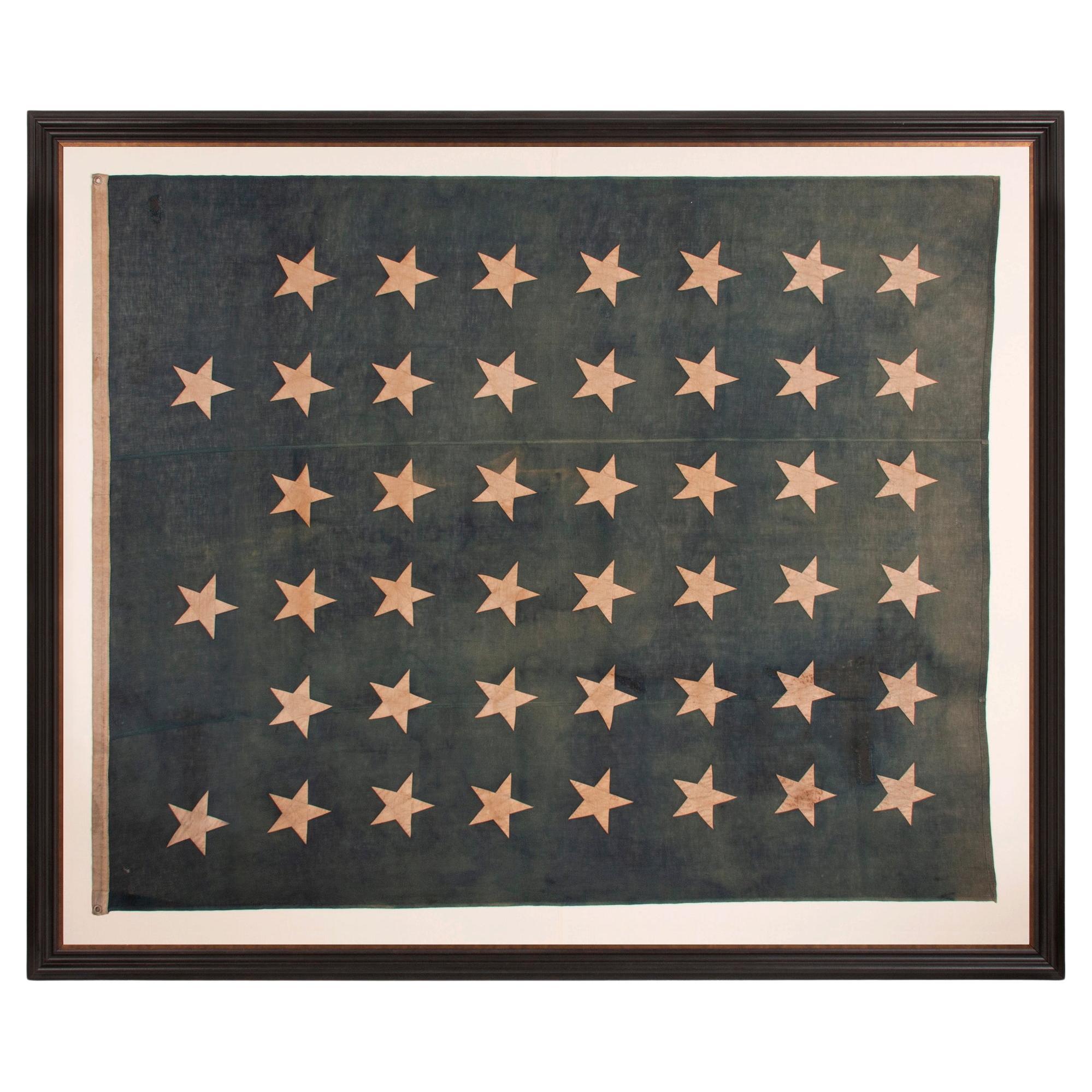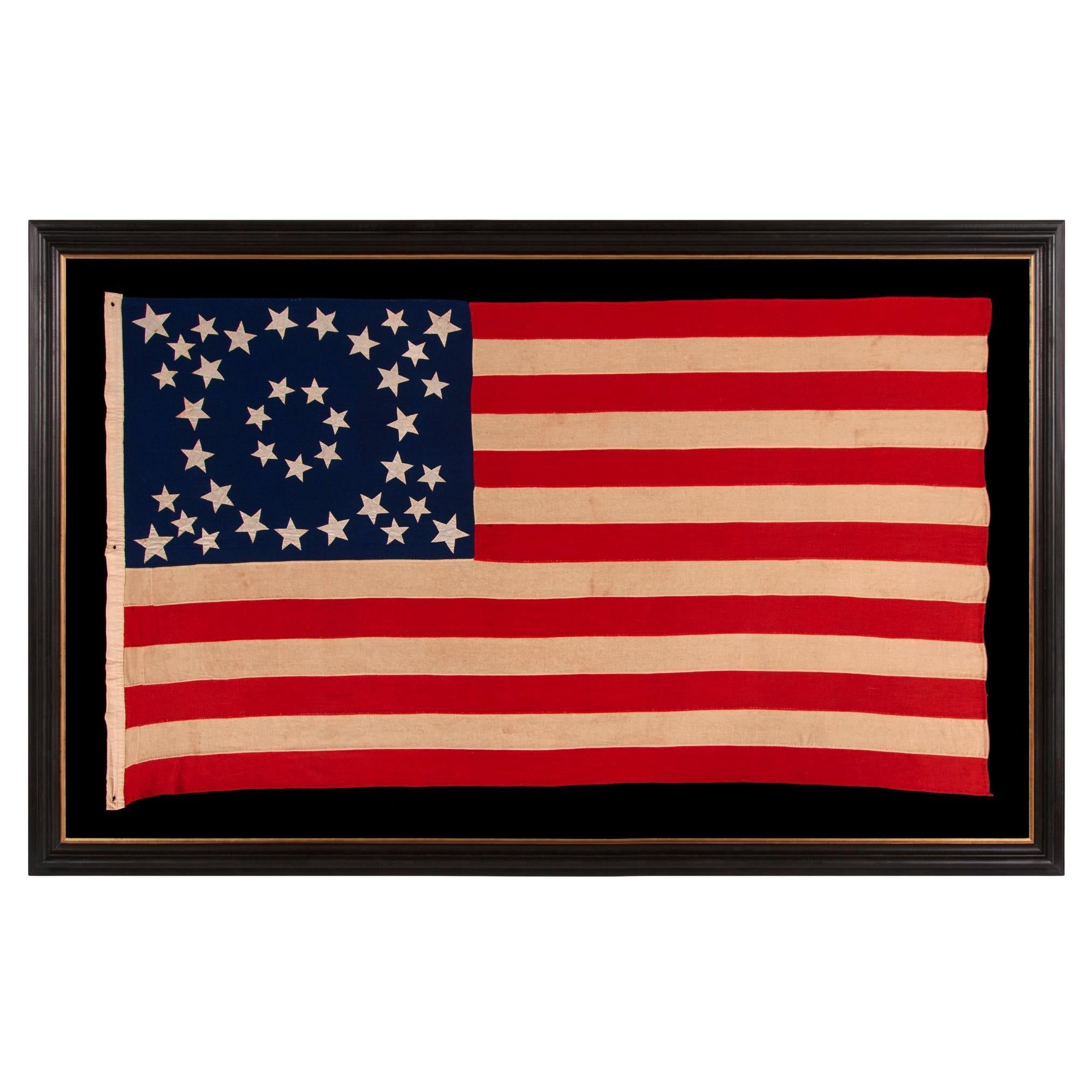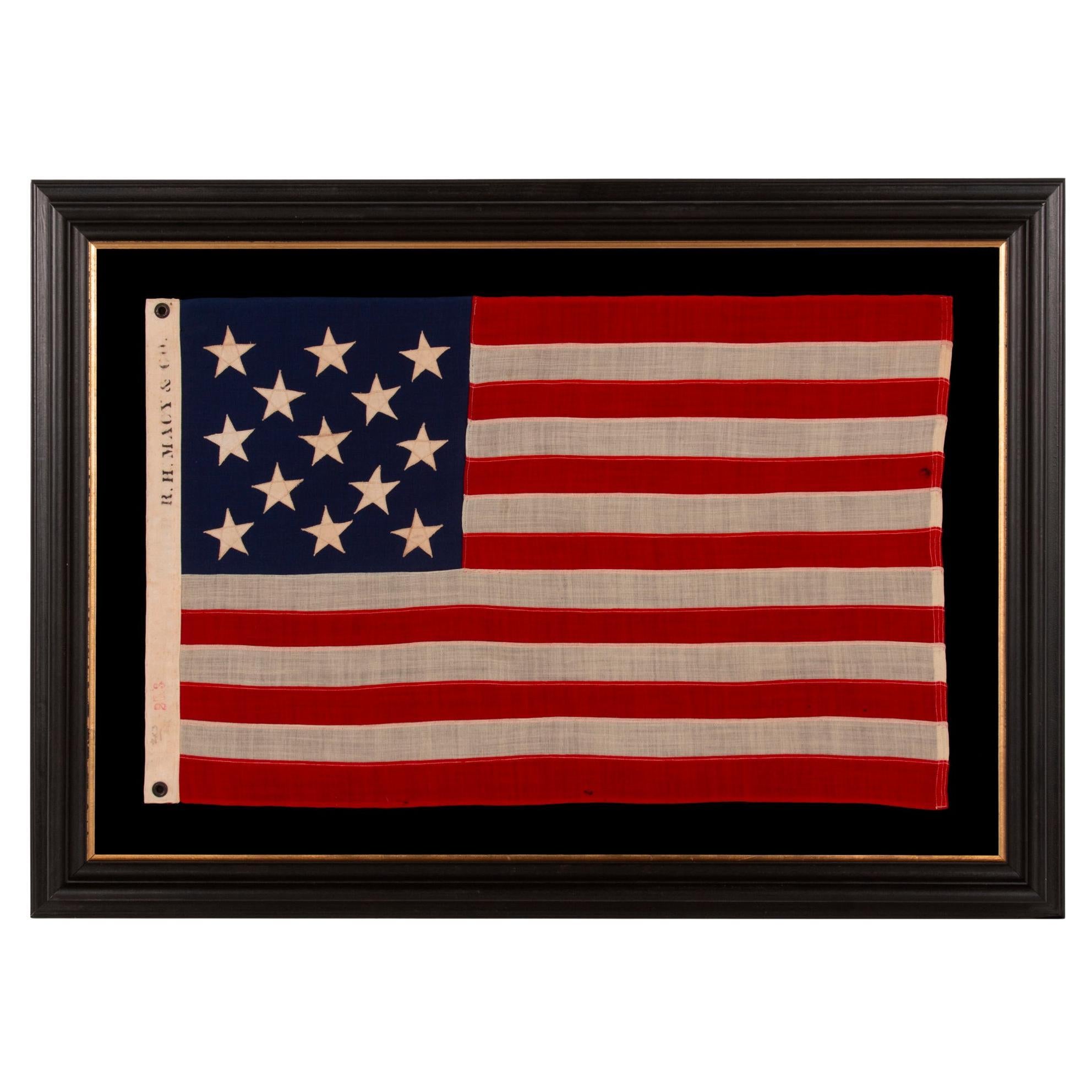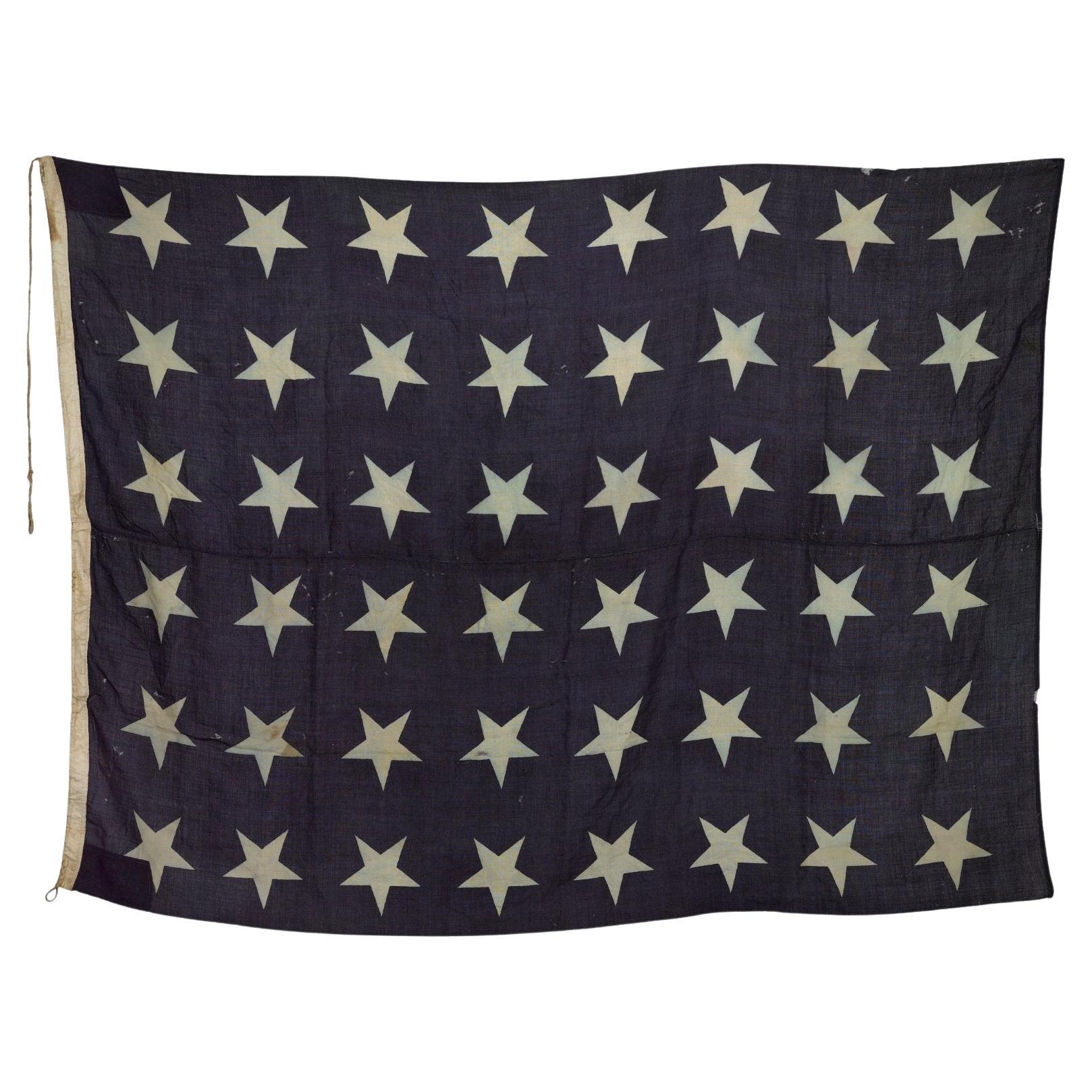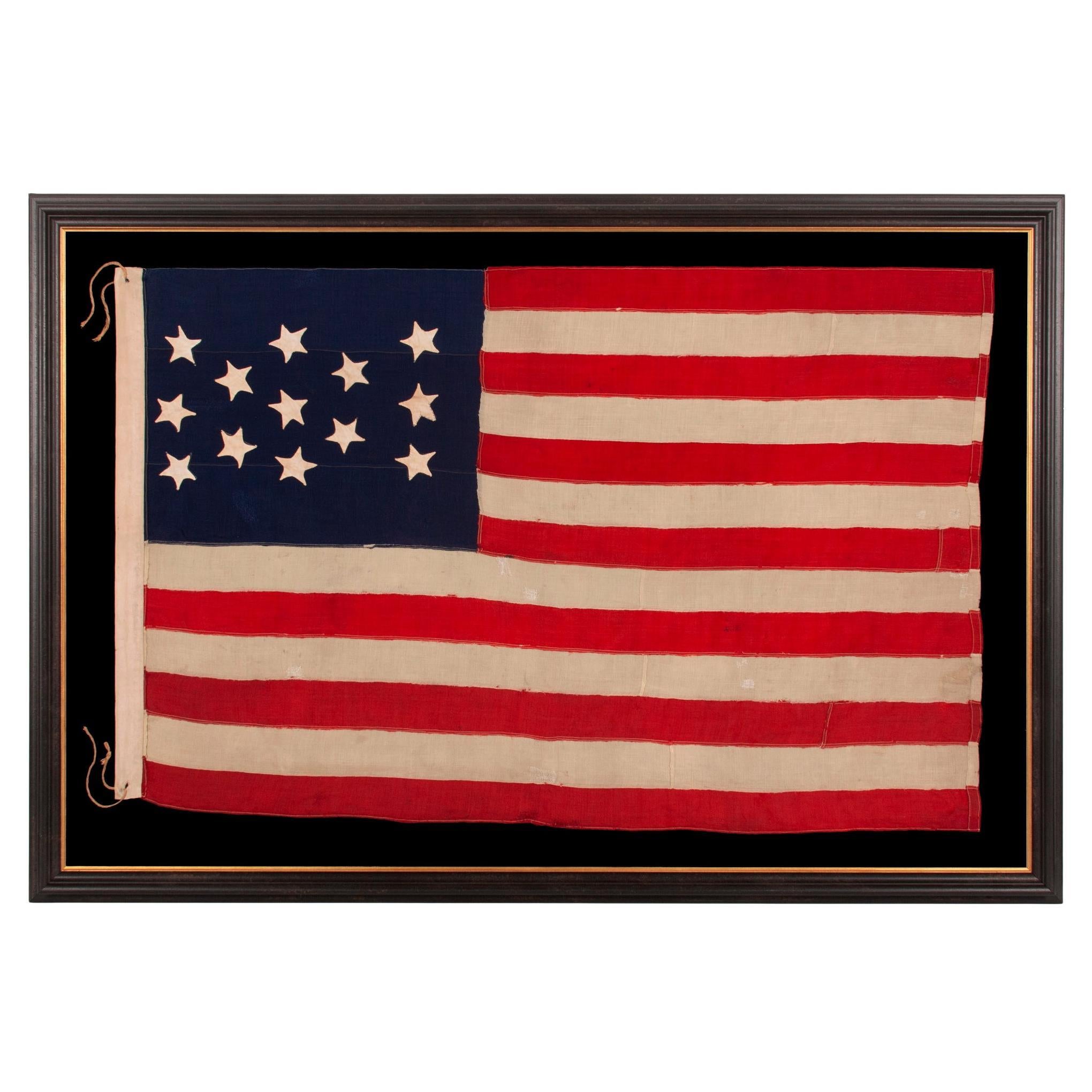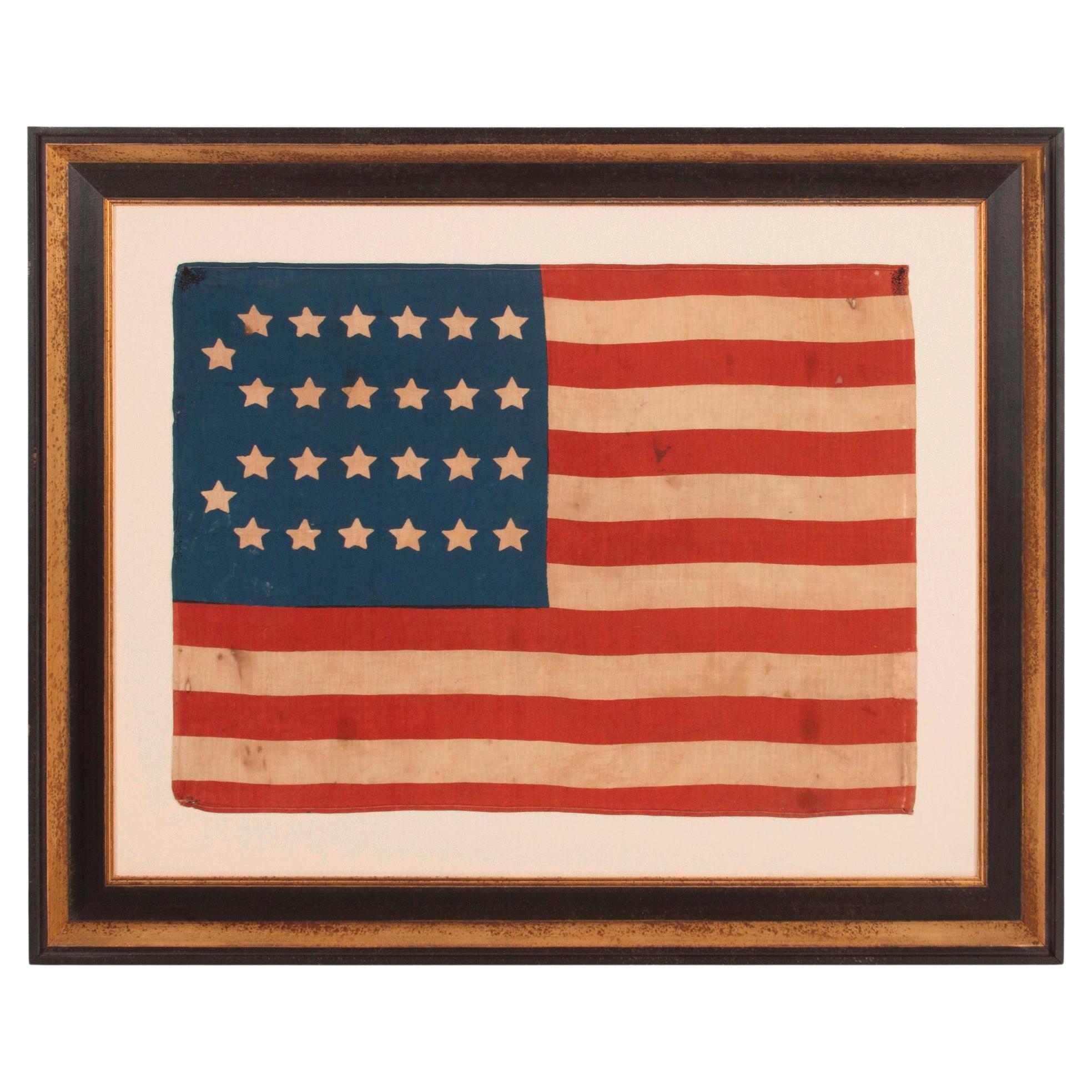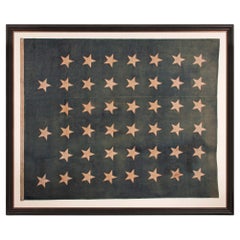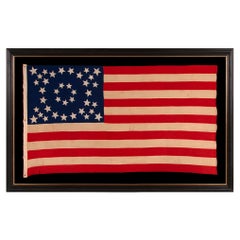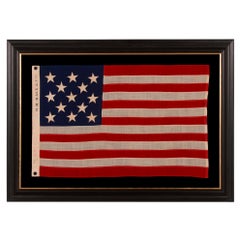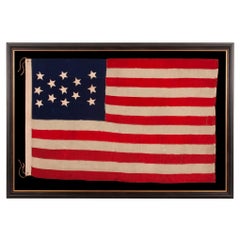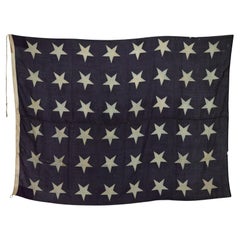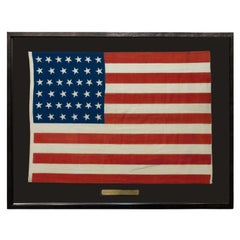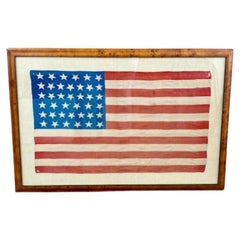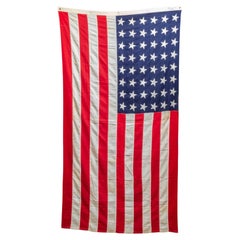Items Similar to 48 Star US Navy Jack Made at Mare Island, California, Dated 1944
Want more images or videos?
Request additional images or videos from the seller
1 of 6
48 Star US Navy Jack Made at Mare Island, California, Dated 1944
Price Upon Request
Price Upon Request
Price Upon Request
Price Upon Request
Price Upon Request
Price Upon Request
Price Upon Request
Price Upon Request
Price Upon Request
Price Upon Request
Shipping
Retrieving quote...The 1stDibs Promise:
Authenticity Guarantee,
Money-Back Guarantee,
24-Hour Cancellation
About the Item
48 STAR U.S. NAVY JACK, MADE AT MARE ISLAND, CALIFORNIA, HEADQUARTERS OF THE PACIFIC FLEET, DURING WWII, DATED 1944
United States Navy jack with 48 stars, made during WWII (U.S. involvement 1941-45) at Mare Island, California, Headquarters of the Pacific Fleet. A black stamp or stencil along the binding, on the reverse, reads as follows: "Union Jack No. 9 MI 44." Heavily flown, with all of the hallmarks of legitimate, wartime use, the extensive yet endearing wear includes not only loss of the hem along the fly, with associated fraying, but the loss of the entire column of stars that followed, as well as remnants of grey paint from the hull or deck of the craft.
Like the British Royal Navy, American vessels flew three flags. When at anchor or moored, the jack is flown at the bow (front), the national flag or "ensign" is flown at the stern (back), and the commission pennant is flown from the main mast. When under way, the Jack is furled and the ensign may be kept in place or shifted to a gaff if the ship is so equipped.
The American Navy jack is a blue flag with a field of white stars. The design is the mirror image of the canton of an American national flag. In scale, the jack was meant to be the same size as the canton of the corresponding Stars & Stripes ensign with which it was flown.
While the technical name for this type of flag is a "union jack," the confusing verbiage, being the same as the nickname of the most recognizable British flag, has resulted in a common shortening of the term to simply "the jack". Interestingly enough, the British ‘Union Jack’ is not the proper name for that signal either. The national design commonly referred to by that name is actually the "Union Flag," though practically no one uses that title or is even familiar with the term. The only time that it can be properly called the "Union Jack" is when the flag is, in fact, flown as the jack on a British Navy ship, from whence name derived. British ships fly various national flags: the white ensign (Royal Navy), blue ensign (non-navy ships in public service), and Red Ensign (merchant ships), each of which is composed of a solid field of the corresponding color, with the ‘Union Flag’ design in the upper, hoist end corner to serve as a canton. The use of the Union Flag as the jack on Royal Navy ships thus employs the same logic as using the blue field with stars (without the red and white striped field) as the American jack.
While U.S. involvement in the Second World War (1941-45) necessitated the acquisition of flags from many sources, the Navy had long made their own flags at several locations, of which Mare Island was one. Located on the western edge of the City of Vallejo, about 23 miles northeast of San Francisco, and actually not an island, but a peninsula, this important base of operations served as the principal seat of U.S. Navy defense on the Pacific. The site was selected following an expedition that set forth in 1850, when Commodore John Drake Sloat was ordered to lead a survey party in quest of a logical site for the Navy’s first West Coast installation. Sloat recommended the location, situated across the Napa River from the Vallejo settlement, noting the strategic advantages of its being "free from ocean gales and from floods and freshets." On November 6th of that year, one year following the Gold Rush and just two months after California gained statehood, President Fillmore reserved Mare Island for government use. The U.S. Navy Department acted favorably on Commodore Sloat's recommendations, and Mare Island was purchased in July, 1852, for the sum of $83,410 for use as a naval shipyard. Two years later, on September 16th, 1854, it became the first permanent Navy base on the Pacific Ocean, with Commodore David G. Farragut serving as its first commander.
Mare Island became home to what was known as the Pacific Fleet and remained so until the threat of Japanese expansionism caused the shift to a more advanced position at Pearl Harbor. It was very active in WWII, Korea, and Vietnam, but close in 1993 after Congress approved the findings of the “Base Realignment and Closure Report.”
The body of the flag is made of wool bunting. The top and bottom edges are hemmed with machine stitching. There is a heavy, sailcloth canvas binding along the hoist, with 2 brass grommets. The general manner in which the flag is made, with heavy, high grade fabrics and uncommonly stout construction, is indicative of U.S. Navy flags of the WWI-WWII era. The triangular patches of wool at the top and bottom of the hoist are called gussets. These are original to the flag's construction and were added for reinforcement at the points where it was subject to the most wear. The stars are block-printed or stenciled in white paint, thickly applied. This is a known technique in use in the manufacture of U.S. naval ensigns at the time and can be seen on other Mare Island flags.
Although the specific history of this flag has sadly been lost to time, the fact that it displays proper evidence of having been flown for an extended period is unusual among surviving examples. Most flags of this nature, brought home by sailors, were ships stores and never saw wartime service. Endearing wear from legitimate use, especially during wartime, is a characteristic appreciated by many in the world of flag collecting.
The 48 star flag became official in 1912 following the addition of New Mexico and Arizona. 48 remained the official star count throughout WWI (U.S. involvement 1917-18), WWII, and the Korean War (1950-53), until Alaska gained statehood in 1959 and the 49th star was added.
Mounting: For 25 years we have maintained a specialized department for this purpose. Our lead conservator holds a master's degree in textile conservation from one of the nation’s top university programs. We take great care in the mounting and preservation of flags and related textiles and have preserved thousands of examples.
The background is 100% hemp fabric, ivory in color. The mount was placed in a dark brown, cove-shaped molding with a wood grain surface and reddish highlights, to which a black-painted, hand-gilded and distressed Italian molding was added as a cap. A shadowbox was created to accommodate the ties, which have a three-dimensional fold. The glazing is U.V. protective acrylic (Plexiglas). Feel free to contact us for more details.
Condition: There is significant loss at the fly end, including an entire column of 6 stars, as described above. There are losses that reach into one star in what is presently the last column, and there is cracking of the paint with associated paint loss elsewhere in the stars. There is modest to moderate soiling along the binding, accompanied by paint transfer from the ship. Many of my clients prefer early flags to show their age and history of use, especially when the presentation translates this well and is pleasing to the eye.
Frame Size (H x L): Approx. 33.5" x 43"
Flag Size (H x L): 22.25" x 31.5"
- Dimensions:Height: 43 in (109.22 cm)Width: 33.5 in (85.09 cm)Depth: 2.5 in (6.35 cm)
- Materials and Techniques:
- Place of Origin:
- Period:
- Date of Manufacture:1944
- Condition:See Item Description.
- Seller Location:York County, PA
- Reference Number:Seller: 48j-10651stDibs: LU849743316102
About the Seller
5.0
Recognized Seller
These prestigious sellers are industry leaders and represent the highest echelon for item quality and design.
Established in 1991
1stDibs seller since 2008
70 sales on 1stDibs
Typical response time: 1 to 2 days
- ShippingRetrieving quote...Shipping from: York County, PA
- Return Policy
Authenticity Guarantee
In the unlikely event there’s an issue with an item’s authenticity, contact us within 1 year for a full refund. DetailsMoney-Back Guarantee
If your item is not as described, is damaged in transit, or does not arrive, contact us within 7 days for a full refund. Details24-Hour Cancellation
You have a 24-hour grace period in which to reconsider your purchase, with no questions asked.Vetted Professional Sellers
Our world-class sellers must adhere to strict standards for service and quality, maintaining the integrity of our listings.Price-Match Guarantee
If you find that a seller listed the same item for a lower price elsewhere, we’ll match it.Trusted Global Delivery
Our best-in-class carrier network provides specialized shipping options worldwide, including custom delivery.More From This Seller
View All45 Star Antique American Naval Jack, ca 1896-1908
Located in York County, PA
LARGE & BEAUTIFULLY FADED, ANTIQUE AMERICAN JACK w/ 45 STARS ARRANGED IN A “NOTCHED” PATTERN, INTENTIONALLY LEAVING SPACE FOR THE 3 REMAINING WESTERN TERRITORIES YET TO BE ADDED; MAD...
Category
Antique 1890s American Political and Patriotic Memorabilia
Materials
Wool
Price Upon Request
Exceptional American Flag, 38 Stars in 3 Sizes in a Fantastic, Unusual Medallion
Located in York County, PA
EXCEPTIONAL ANTIQUE AMERICAN FLAG WITH 38 GLAZED COTTON STARS, IN 3 DIFFERENT SIZES, ARRANGED IN A BEAUTIFULLY GRAPHIC, DOUBLE-WREATH STYLE MEDALLION, WITH TRIANGLES OF 4 STARS IN ...
Category
Antique Late 19th Century North American Political and Patriotic Memorab...
Materials
Silk
13 Star Antique American Flag, Marked "R.H Macy & Co", circa 1895-1926
Located in York County, PA
13 STAR ANTIQUE AMERICAN FLAG WITH A 3-2-3-2-3 CONFIGURATION OF STARS; A SMALL-SCALE EXAMPLE, MADE IN THE 1895-1926 ERA, MARKED “R.H. MACY & CO.”
13 star antique American flag of th...
Category
Antique Late 19th Century American Political and Patriotic Memorabilia
Materials
Wool
Price Upon Request
13 Star Antique American Flag with a Narrow Star Presentation, ca 1876
Located in York County, PA
13 STAR ANTIQUE AMERICAN FLAG WITH HAND-SEWN STARS IN AN EXTREMELY NARROW PRESENTATION OF A 3-2-3-2-3 ARRANGEMENT ON A CANTON THAT DOESN’T FOLLOW SUIT, LEAVING WIDE EXPANSES OF BLUE ...
Category
Antique 1870s American Political and Patriotic Memorabilia
Materials
Wool
Price Upon Request
26 Star Antique American Flag, with 11 Stripes, Michigan Statehood, ca 1837-1846
Located in York County, PA
26 STAR ANTIQUE AMERICAN PARADE FLAG WITH 11 STRIPES AND IT’S CANTON RESTING ON THE “WAR STRIPE.” THE EARLIEST KNOWN STAR COUNT FOR PRINTED EXAMPLES, 1837-1846, MICHIGAN STATEHOOD
2...
Category
Antique Mid-19th Century American Political and Patriotic Memorabilia
Materials
Cotton
13 Star Antique American Parade Flag, ca 1876-1899
Located in York County, PA
13 STAR ANTIQUE AMERICAN PARADE FLAG, WITH A 3-2-3-2-3 CONFIGURATION OF STARS, AN EXTREMELY SCARCE AND UNUSUALLY LARGE VARIETY, MADE circa 1876-1899
13 star American national parade...
Category
Antique Late 19th Century Canadian Political and Patriotic Memorabilia
Materials
Cotton
Price Upon Request
You May Also Like
48-Star American Naval Jack Flag
Located in Colorado Springs, CO
Presented is a large 48-star American Naval Jack. This impressive wool flag features a rich navy flag with a field of 48 white stars. The stars are arranged in six rows of eight star...
Category
20th Century American Nautical Objects
Materials
Wool, Rope
39-Star Antique American Flag with 'Whimsical' Star Pattern, 1889
Located in Colorado Springs, CO
This is a 39-star unofficial American flag, handmade and printed on cotton. The flag dates to 1889 and has a unique history, thanks to its rare star-count.
The flag’s canton is prin...
Category
Antique 1880s American Political and Patriotic Memorabilia
Materials
Cotton
19th Century American 39 Star Flag, circa 1889
Located in Nantucket, MA
19th Century American 39 Star Flag, circa 1889, a period printed silk parade flag with a wavy pattern of dancing stars. This was never an official flag of the United States but was m...
Category
Antique 1880s American Federal Political and Patriotic Memorabilia
Materials
Silk
Large Hand Sewn American Flag with 48 Stars c.1940-1950
Located in San Francisco, CA
ABOUT
A large hand sewn American flag made with 48 hand sewn stars and stripes with brass grommets to hang.
CREATOR Valley Forge Flag Co.
DATE OF MANUFACTURE c.1940-1950....
Category
Early 20th Century Industrial Political and Patriotic Memorabilia
Materials
Brass
19th Century 39 Star American Flag, circa 1889
Located in Nantucket, MA
19th Century 39 Star American Flag, circa 1889, a printed linen ensign with 39 stars arranged in a wavy star pattern, with stripes in a very unus...
Category
Antique 1880s American Federal Political and Patriotic Memorabilia
Materials
Linen
48-Star Printed American Flag, Commemorating Arizona Statehood, 1912-1958
Located in Colorado Springs, CO
This is an original 48-star American parade flag, celebrating Arizona statehood. A wonderful product of our nation's early history, this flag is an authentic antique, with a fly date...
Category
Mid-20th Century American Political and Patriotic Memorabilia
Materials
Fabric
More Ways To Browse
Early California Furniture
Black Memorabilia
Block Island
Used Navy Anchors
Japanese Art Ocean
Vintage American Memorabilia
Star Of David Furniture
Union Jack
Royal Flag
British Royal Navy
Anchor Blocks
Royal Memorabilia
Navy Flags
Stars And Stripes Vintage
Mexican Vintage Mirror
Italy Flag Vintage
Korean Folk Art
Striped Mirror
